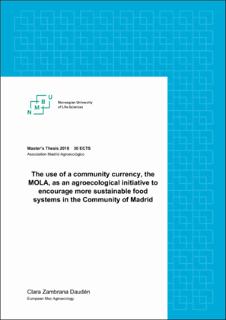| dc.contributor.advisor | Nicolaysen, Anna Marie | |
| dc.contributor.advisor | Lieblein, Geir Hofgaard | |
| dc.contributor.author | Zambrana Daudén, Clara | |
| dc.coverage.spatial | Spain, Madrid | en_US |
| dc.date.accessioned | 2023-01-26T14:09:08Z | |
| dc.date.available | 2023-01-26T14:09:08Z | |
| dc.date.issued | 2018 | |
| dc.identifier.uri | https://hdl.handle.net/11250/3046644 | |
| dc.description.abstract | Changing behavior patterns concerning the management of organic waste in the common population is a first step to start making a change towards an agroecological way of production and consumption of food. In this master thesis I explore if this change is possible at a local level and the important and direct implications it can have through the use of a community currency, the MOLA. MOLA explores more efficient bio-waste recycling systems in environmental and economic terms with a huge social involvement that is very innovative in the Community of Madrid and in Europe. Citizens, schools and restaurants deliver their organic waste in exchange for the MOLA currency, which consumers can make use of it in local shops and in nearby farm products. This bio-waste is then agrocomposted by nearby farms keeping a circular economy at a very local level.
Several face-to-face interviews with the main stakeholders followed by an online questionnaire and participatory observation were the chosen methods to approach the investigation. The interviews were especially useful to know the shops and farmers point of view about the use of the currency, while the online questionnaire was more consumer oriented. Overall, the currency was rated as an important educational tool for social and environmental awareness, but its local limitation when it comes to spending it, makes it difficult to use it more frequently. New ways of MOLAs transactions could encourage more people to start using the MOLA beyond the local limits, echoing into the public institutions to allocate more funds and accepted for municipal expenses. The MOLA could be a “teaching” tool for the common population on how to make a better use of the organic waste and stand up for more sustainable food systems in the near future. | en_US |
| dc.language.iso | eng | en_US |
| dc.publisher | Norwegian University of Life Sciences, Ås | en_US |
| dc.rights | Attribution-NonCommercial-NoDerivatives 4.0 Internasjonal | * |
| dc.rights.uri | http://creativecommons.org/licenses/by-nc-nd/4.0/deed.no | * |
| dc.subject | MOLA | en_US |
| dc.subject | Agrocomposting | en_US |
| dc.subject | Circular economy | en_US |
| dc.subject | Sustainable food systems | en_US |
| dc.subject | Organic waste management | en_US |
| dc.title | The use of a community currency, the MOLA, as an agroecological initiative to encourage more sustainable food systems in the Community of Madrid | en_US |
| dc.type | Master thesis | en_US |
| dc.source.pagenumber | 71 | en_US |
| dc.description.localcode | M-AE | en_US |

